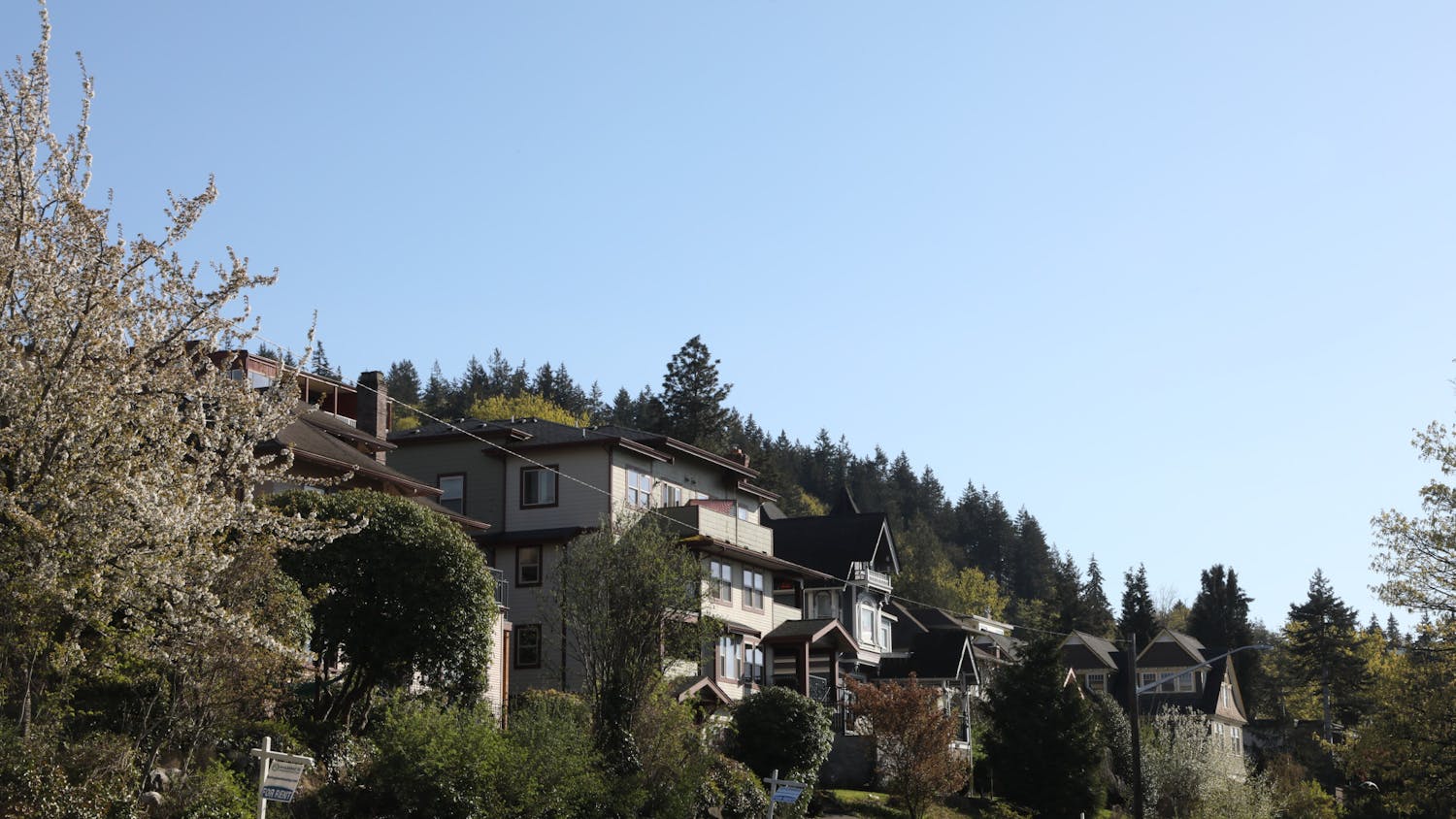A CSA basket from another local provider, Acme Farms. //
Photo courtesy of Kelsey Lauer
Produce can come from anywhere.
For most, that’s a supermarket, but programs are available in Bellingham that offer fresh, organic produce straight to the doorsteps of customers.
Every two weeks, sophomore Annika Mancini opens up her door to a box of fresh fruits and vegetables. They didn’t grow there, but were planted there by the local business Dandelion Organic.
Mancini’s box is part of a national program, Community-Supported Agriculture, or CSA. Consumers are able to buy produce directly from local farmers by signing up for a CSA basket delivery service, which organizes and delivers baskets of produce from local farms.
Co-founders of Dandelion Organic, Maria Stavrakas and her husband Jonny Lane said they opened Dandelion Organic in 2007, making it the first produce home-delivery service in Bellingham.
With a focus on local, organic and fresh produce, Stavrakas and Lane said their business provides fruits and vegetables to the greater Bellingham area.
“Jonny and I wanted meaningful work for ourselves,” Stavrakas said. “We were thinking, ‘what could we do that we would feel really good about doing that is within our skill set as well?’”
Stavrakas said she grew up in the food service industry while Lane worked in retail and management. With an interest in sustainable practices, they said they decided to create a business together, something they had never done before.
“There’s something wholesome about getting the box at my door,”
Sophomore Annika Mancini
They said their passion for conservation motivated them to set high standards for their own business.
“Working for someone else [was frustrating], being like, ‘hey, could you please recycle that?’ or ‘could you please reuse that?’,” Stavrakas said.
Some of their conservation efforts have been used since the beginning of Dandelion Organic. Stavrakas and Lane said they have maintained a zero-waste work environment for the entire time they’ve had their business. Implementing reusable containers, producing less than a handful of trash a week and collecting film plastic for recycling are just a few of their sustainable practices.
Sophomore Sydney Kaster said she knows Stavrakas and Lane follow through with this philosophy in their personal lives.
She said she found the two through a posting on Western’s job site. The couple was looking for someone to clean their house in exchange for the baskets. Kaster said she has been cleaning their house for a year now.
“Even all of their cleaning products are not actual cleaning products, it’s like vinegar water,” she said. “They also don’t use any plastic for their garbage or paper towels or anything.”
Mancini said Kaster’s enthusiasm for the Dandelion Organic delivery service convinced her to jump on board as well.
“There’s something wholesome about getting the box at my door,” Mancini said. “It feels good to not feel wasteful.”
She said she splits the bi-weekly $40 box with one of her roommates and it usually lasts them about a week and a half.
Stavrakas said purchasing a CSA basket is a good approach for a college student on a budget, or for low-income households.
“If you’re buying a prepared sandwich, you’re going to be spending around six or seven dollars at least,” she said. “You can, from about seven to ten dollars, depending on who you’re sharing it with or what size bin you’re getting, get a delivery of fruits and vegetables to your home.”
However, Stavrakas is still waiting for the service to gain a wider audience. She said there are a few groups of elderly and college students who pay for the boxes, but the majority of the customers are families with children.
Despite Stavrakas’ optimism, Fairhaven College professor Clayton Pierce said he has doubts about how realistic CSA baskets are.
Pierce said he questions the impact of these services when they may not be affordable to a wider amount of community members, especially those who are considered “food insecure.”
The term “food insecure” is used to refer to persons who may not have access to healthy food options, or are in a financial situation where they may not be able to afford those options even if they existed nearby. Thus, they are the most vulnerable to not having access to healthy food, Pierce said.
“There are built-in privileges to who can access the food baskets in a couple different ways,” Pierce said. “I think the cost is somewhat prohibitive. It sounds more expensive than if one went to a grocery store and bought the same things.”
However, despite the drawbacks, he said he still thinks the model is great and is supportive of alternatives to the large corporate options, where commodification of food has led to unequal access to food.
Pierce said that the contract Western has with Aramark, their foodservice provider, limits Western’s options for sourcing produce locally. He said that food sales on campus have to go through Aramark, making it nearly impossible to get food grown in The Outback Farm, for example, into the cafeterias.
“I would like to grow the Outback and have more places like it,” Pierce said. “We could get the food from there into campus and connect it to communities in the Bellingham area who don’t have access to places that grow food or can’t afford baskets.”
Aramark’s meal plans are marketed as convenient, but at around $13 a meal for the smallest plan according to Western’s dining service website, it’s more expensive than preparing food at home using delivered produce.
However, food preparation is time-consuming, so despite the lower cost, there is a downside.
For Kaster though, she said the boxes have helped her forge a healthier relationship with food.
“[The baskets] really helped me with not only the variety of fruits and vegetables that I eat, but the quantity of fruits and vegetables that I eat,” Kaster said. “My diet transitioned from what was fast and easy to more fruit and vegetable based.”
Stavrakas said this mentality is what she is hoping to pass down through her business. She wants to incorporate that same positive view toward food into her life, one that she learned as a child growing up in Greece.
She said in Greece she was surrounded by an appreciative attitude toward food which shaped her outlook on it.
“With Greeks, they don’t necessarily think of it like ‘I need to eat healthy and it’s nutritious,’” Stavrakas said. “They’re really all about eating what’s delicious as well, but it really goes hand in hand.”
Stavrakas said she understands college students looking for produce may seek out cheaper options, but the small price difference between products from Dandelion Organics and supermarket produce is due to the nature of her products.
“I know you can shop for those vegetables cheaper [by] going to places we can’t compete with price-wise, [but] we’re offering a different product, especially with the local stuff,” Stavrakas said.
However, she said it’s worth considering the upsides to getting produce delivered. She said the Dandelion Organics service decreases the time and money spent on gasoline going to grocery stores, while exposing people to foods they may have never heard of.
Additionally, she said if a customer doesn’t like a particular fruit or vegetable in their basket, they have the option to switch it out for any other fruit or vegetable they like.
For Kaster and Stravkas, the options and quality of the baskets can make the few extra dollars worth it for customers.
“My little brother visited me one time and I gave him one of the peaches,” Kaster said. “He was freaking out about how good it was.”
Dandelion Organic can be found through their online site or at the weekly Farmer’s Market, selling olives and olive oil from their farm in Greece.





